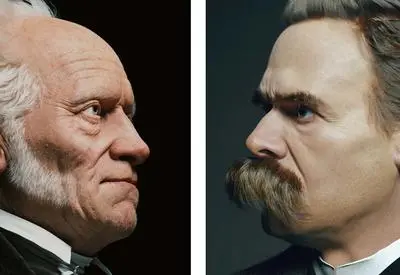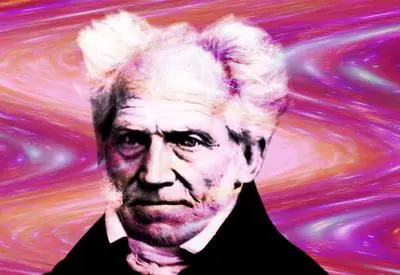Have we been making progress over history? Or is the world made of a fundamental essence that never changes? What is the meaning of time? And the timeless? Schopenhauer and Hegel famously did not get along. But their feud was philosophical, as well as personal, writes Joshua Dienstag.
In the summer of 1820, Arthur Schopenhauer, aged 32, arrived at the University of Berlin to give a lecture course with the grandiose title of ‘Universal Philosophy’. Incredibly, he asked the registrar to schedule his lectures at the same hour as those of G.W.F. Hegel. Hegel held the university’s chair in philosophy and, at that point, was probably the most famous philosopher in the German-speaking world.
 SUGGESTED READING
Schopenhauer vs Nietzsche: The meaning of suffering
By Joshua Foa Dienstag
SUGGESTED READING
Schopenhauer vs Nietzsche: The meaning of suffering
By Joshua Foa Dienstag
Hundreds of students attended Hegel’s lectures. Five registered for Schopenhauer’s. In the following semester, Schopenhauer attracted zero students so his lectures were cancelled. That was the end of his university career.
Hegel, the elder by eighteen years, only met Schopenhauer once and took no notice of the younger man in his writings. Schopenhauer, by contrast, raged at Hegel for years.
After Hegel’s death in 1831, his reputation began to decline and a strange reversal began. Over the following decades, it was the obscure lecturer who became the more famous philosopher. His later works sold thousands of copies and went through multiple printings. For many, Schopenhauer’s pessimism set the philosophical agenda in the second half of the nineteenth-century and beyond, while Hegel’s Enlightenment optimism became the object of ridicule. What had happened?
Schopenhauer had wanted his lectures to offer a clear alternative to Hegel and he was not wrong that the philosophical perspectives of the two men were radically opposed to one another. Indeed, their disagreements were metaphysical. That is, they disagreed about the very nature of the world and what we could know about it.
Both men began as followers of Immanuel Kant but they took his conclusions in entirely different directions. Kant started from the claim that we could never learn the truth about the world just from the information of our senses. Our sense impressions are just noise without a mind to organize them. More specifically, scientific knowledge required mental categories like space, time and causality. Since we all share these categories, we could also share and verify each other’s observations. Science and ‘Enlightenment’ were thus social products.
Hegel took these ideas to have established the validity of modern science, including the ‘science’ of history, which found patterns in the world and established scientific laws from the collective observations of many. Hegel built on Kant’s theory of history, which was rudimentary, and made it into the central category of his philosophy. Human culture and ideas developed over time, he thought, not just in individuals or groups, but in the species as a whole, following a predictable pattern. “The unfolding of the truth,” he wrote, was “revealed in world-history.”
___
Truth wasn’t found in history at all but in what was outside it
___
To validate this claim that humanity was always in the process of becoming something better, Hegel proposed to retell all of human history as a single story of human growth and development. The lectures that attracted hundreds of Berlin students were the result. Hegel described Indian, Chinese, Greek and Roman civilizations in great detail. But all with the aim of proving that their singular path of improvement led inevitably to modern European civilization. The Age of Enlightenment, to him, was the point at which humanity could begin to comprehend this centuries-long story and enjoy its maturity and ‘self-consciousness’. History was Truth or, as he put it, “what is rational is actual and what is actual is rational.”
In fact, this story of Europe’s civilizational superiority was deeply provincial. Hegel’s “world history” left out Africa and the Americas entirely. His knowledge of them was scant and his attitudes deeply racist. His theodicy seemingly justifies any violence and bloodshed of the past by claiming that it was necessary for progress. But it took a long time for Europeans to register these elements of his history as problematic.
There was another kind of problem, however, that did bother his contemporaries. Hegel’s optimistic story of unbroken growth and development likened human growth to the development of the body, growth that culminates in a final mature form. Thus, to Hegel, “Europe is the Absolute End of History”. He meant this as praise, but it is easy to understand why not everyone agreed.
Meanwhile, Schopenhauer took an entirely different lesson from Kant’s theory of knowledge. To him, the fact that human understanding relied on mental categories meant that there was something fundamentally illusory about it. The real world (which Kant had called the unknowable ‘thing-in-itself’) stood apart from space and time.
To Schopenhauer, it was the unreality of time that was the most important, precisely because it called into question our whole notion of history and any philosophy of history: “the truly real”, he wrote, “is independent of time and hence is one and the same in every point of time.”
Hegel’s mistake was understandable to Schopenhauer because it was an entirely natural one. The very structure of the mind tried to impose a temporal order on our understanding of the world. But it is one thing (and perfectly practical) to try to make sense of your everyday experience and quite another to imagine that you have discovered the Laws of History. Hegel’s metaphysics, Schopenhauer thought, were exactly backwards: Truth wasn’t found in history at all but in what was outside it.
Much harder, to Schopenhauer, was the effort necessary to understand that “The true philosophy of history … consists in the insight that, in spite of all the … endless changes and their chaos and confusion, we yet always have before us only the same, identical unchangeable essence, acting in the same way today as it did yesterday and always.”
Schopenhauer’s pessimism did not consist in a belief that things were getting worse – that would have been just as foolish a conclusion as Hegel’s belief in historical progress. Schopenhauer simply rejected the idea that things were always getting better and were somehow fated to do so.
He was in no way opposed to the material benefits of modern science. What he opposed was the idea that these kinds of changes signaled our mastery of nature or history, such that the future would be fundamentally different from the past.
He also did not think pain could be justified by some glorious future, either for the individual or the species. While his social and political views were in many respects sexist and reactionary, he did denounce the suffering of slavery and did not imagine (and so many of his contemporaries did) that the violence of imperialism could be justified by the spread of Enlightenment values.
In other words, he rejected the idea that human beings were fundamentally ‘becoming’ anything; for better or worse, we are what we have always been.
___
In the twentieth century, the disasters and genocides of two world wars largely put paid to Hegelian history, while Schopenhauer’s pessimism, though rarely swallowed whole, became the starting point for philosophies that centered suffering, dislocation and estrangement
___
But it was in his personal attitude towards life that Schopenhauer’s divergence from Hegel was especially vivid. Our constant striving for satisfaction, to Schopenhauer, which the illusion of temporality fostered, was bound to end in disappointment. If we really wanted to reduce the world’s suffering, or our own, we needed to resign from life. Not by suicide (another futile action as far as he was concerned) but by withdrawal and quiet. “Resignation,” he wrote, “is like the inherited estate; it frees its owner from all care and anxiety.”
Rather than self-harm, Schopenhauer thinks of the kind of ‘losing yourself’ that results from the contemplation of art. The real pleasure of art, he thinks, is not that it depicts something beautiful but that, in transporting us out of our subjective state of striving to an objective state of contemplation, it allows us a temporary respite from daily miseries and a glimpse of the eternal that we can never really know. An artistic genius, to him, was someone who could absent their ego and let the timeless world speak itself through their hand.
‘Resignation’ to Schopenhauer was liberation from the tyranny of optimism. Hegel’s optimism demands that we see our life as a project, with achievement and happiness as goals at which everyone can justifiably aim and, indeed, is entitled to. Pessimism liberates us from this narrative of individual progress as it denies the larger narrative of historical progress. It doesn’t ensure happiness, but it relieves us of the unhappiness that optimism unwittingly generates.
 SUGGESTED READING
Schopenhauer and the insatiable will to live
By Robert Wicks
SUGGESTED READING
Schopenhauer and the insatiable will to live
By Robert Wicks
Already by the end of the nineteenth century, Hegel’s singular narrative of world history had come to seem implausible to his contemporaries. In the twentieth century, the disasters and genocides of two world wars largely put paid to Hegelian history, while Schopenhauer’s pessimism, though rarely swallowed whole, became the starting point for philosophies that centered suffering, dislocation and estrangement, like existentialism and psychoanalysis. Nietzsche, Heidegger, Freud and Camus all owe something to Schopenhauer.
As the war in Ukraine reminds us, no peace is permanent, no matter how rational and stable it may seem. We need not fully embrace Schopenhauer’s resignation to learn the lessons of his pessimism: that the world is not ours to master, that suffering cannot be eradicated by optimism, and that history is not prewritten in our favor. As disappointing as these truths may be, they do liberate us from false hopes and mental crutches and let us see the world more clearly. That is all that Schopenhauer, if he had allowed himself to hope, would have hoped for.






















Join the conversation